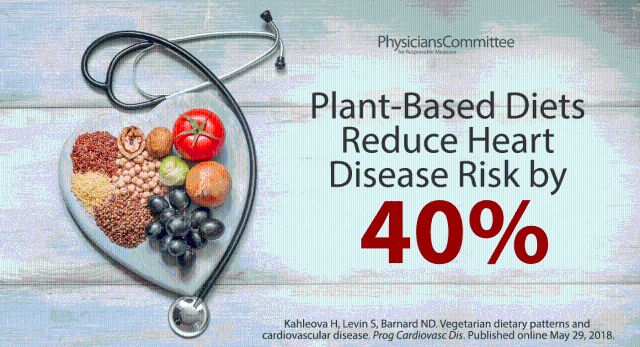Reduce Your Heart Disease Risk with a Plant-Based Diet

Did you know heart disease is the leading cause of death for men and women in the United States (CDC)? While high blood pressure, high cholesterol, inactivity, obesity, and smoking may be well-known contributors, an unhealthy diet is among the several key risk factors for heart disease. Diet plays a key role in your heart health—either helping to prevent or contributing to heart disease.
It’s important to know the role your diet plays in your heart health, and the power you have to help prevent heart complications in the future.
Animal products, cholesterol, and Heart Disease risks

Animal products such as meat, eggs, and dairy products are high in cholesterol and saturated fat which cause plaque buildup in the arteries. A buildup of plaque, or fatty substances, that accumulate in the arteries can cause serious life-threatening complications, including a heart attack, blood clots, or cardiac arrest.
The National Institutes of Health reports on a recent study concluding that those who ate a rich red meat diet had "triple the levels of a chemical [TMAO, trimethylamine N-oxide), produced when your body digests red meat] linked to heart disease" (compared to people eating diets rich in white meat or plant-based protein).
“This study shows for the first time what a dramatic effect changing your diet has on levels of TMAO, which is increasingly linked to heart disease,” said Stanley L. Hazen, M.D., Ph.D., senior author of the study and section head of Preventive Cardiology & Rehabilitation at the Cleveland Clinic. “It suggests that you can lower your heart disease risk by lowering TMAO” (National Institutes of Health).
“These findings reinforce current dietary recommendations that encourage all ages to follow a heart-healthy eating plan...this means eating a variety of foods, including more vegetables, fruits, whole grains, low-fat dairy foods, and plant-based protein sources such as beans and peas”, says nutrition researcher Dr. Charlotte Pratt.
But what are the results for those with moderate to severe heart disease?
Does a plant-based diet make much of a difference or aid in the regression of heart disease?
Dr. Ornish wanted to answer the same questions. He tested how a plant-based diet affected participants with moderate to severe heart disease through diet and lifestyle changes, no medical procedures involved.
The results? After a few weeks, 90% of chest pain diminished. A month later, blood flow improved to the heart, and a year later, even severely blocked arteries had reopened (PCRM).
How plant-based foods help fight heart disease

Plant-based diets contain no dietary cholesterol, very little saturated fat, and an abundant source of fiber. Plant-based foods are also rich in phytonutrients that help promote overall health, sustained energy, blood flow and viscosity, lower inflammation, and reduce oxidation.
According to a study posted by the Journal of the American Heart Association, “consumption of a plant‐centered, high‐quality diet starting in young adulthood is associated with a lower risk of cardiovascular disease by middle age, independent of their earlier diet quality.”
That’s good news. It means it’s not too late to take control of your health and make dietary and lifestyle changes that help reduce the risk of heart disease.
According to the Physicians Committee, a plant-based diet can also help improve several risk factors for heart disease.
Plant-based foods rich in potassium, like bananas, oranges, potatoes, cooked broccoli and more, help improve blood pressure. Plant-based foods high in fiber, like apples, lentils, beans, and peas can help lower cholesterol.
A plant-based diet can also help reduce inflammation due to the high antioxidant profiles of plant based foods.
“If you change your diet, and do it very vigorously, you have enormous power. You can reverse heart disease. You can prevent it."
-Neal Barnard, MD, FACC, and President of Physicians Committee
How to get started with Plant-Based Diet

It’s always important to work closely with your health care provider when making dietary changes.
Whether you have a predisposition to heart disease or are facing complications now, or just want to prevent future risks of heart disease, incorporating a plant-based diet can be a simple way to fight the risk of heart disease.
Incorporating more plant-based foods in your diet doesn’t have to happen all at once. Start at a pace that works for you, and keep it simple.
If you're feeling overwhelmed on where to start, Whole Harvest plant-based meal delivery service offer a healthier way to cook quick and delicious meals at home. Whole Harvest meals are chef-created ready-to-eat meals packed with fresh, plant-based ingredients—a convenient solution to healthy eating without the stress of weekly meal planning. Check out Whole Harvest's full menu and available meal plans—fresh, plant-based, ready-to-eat meals delivered to your door.
